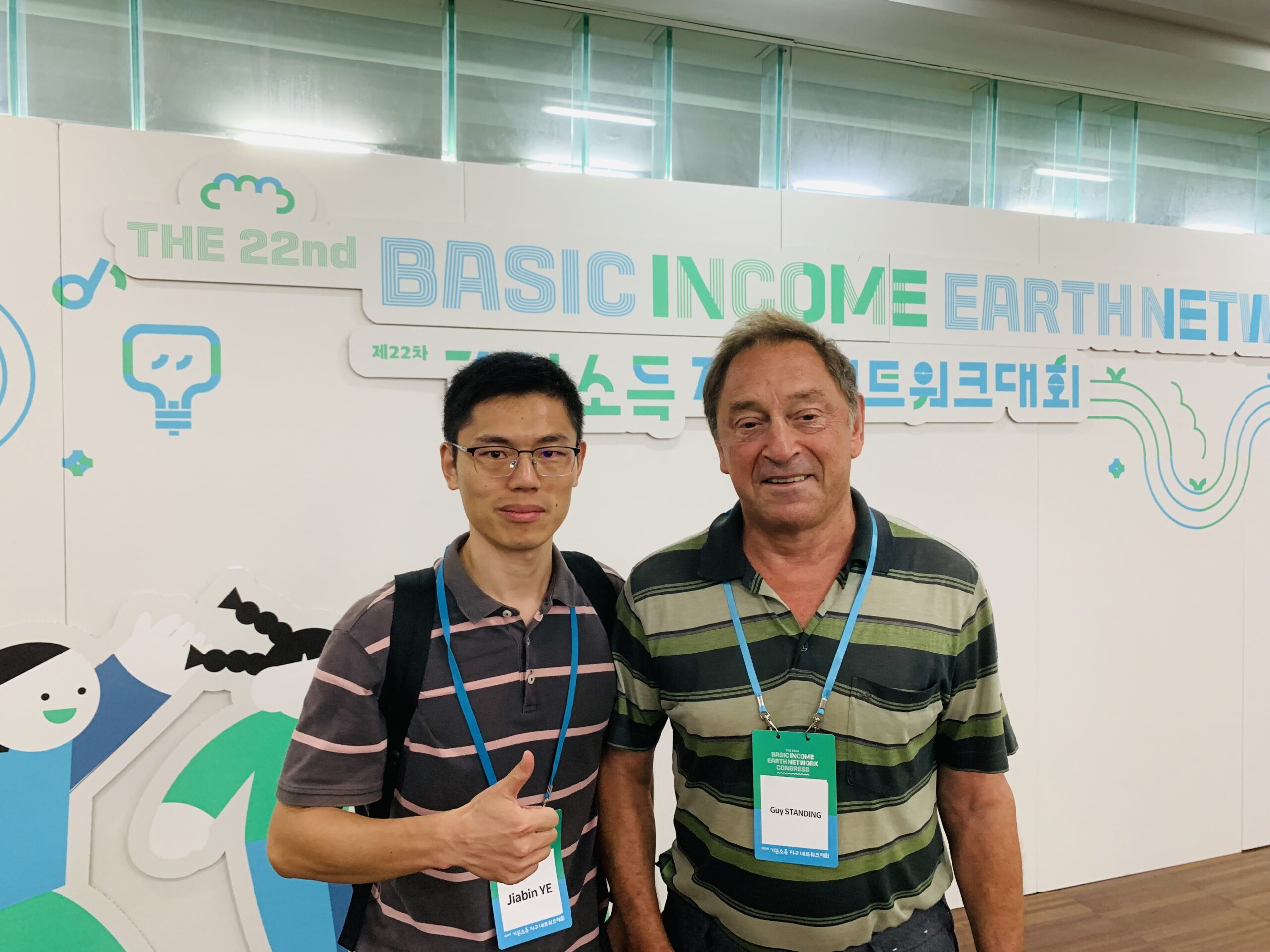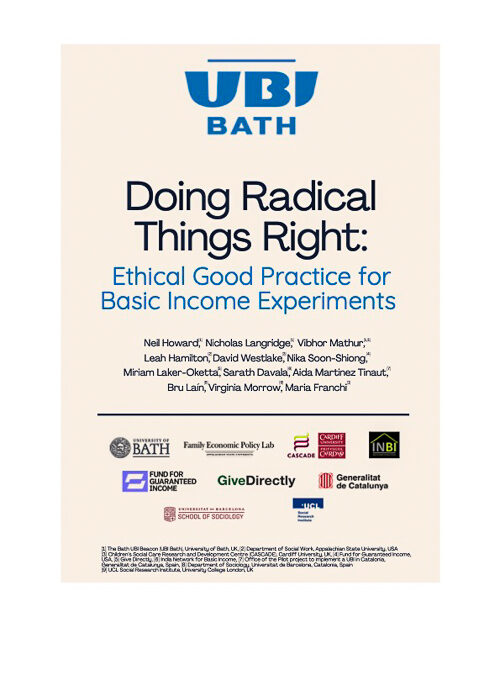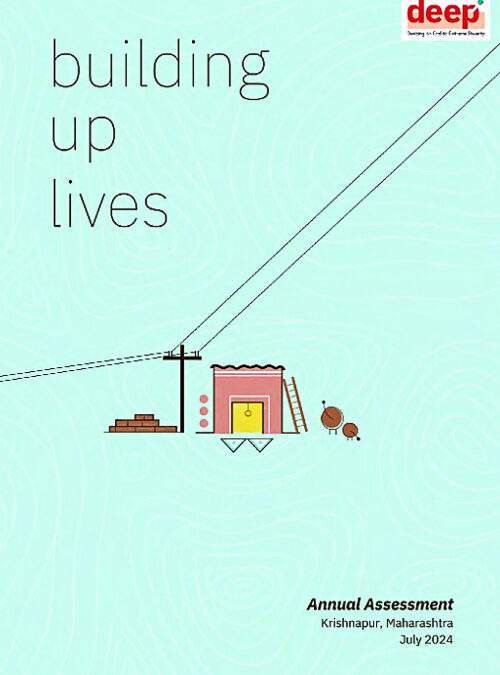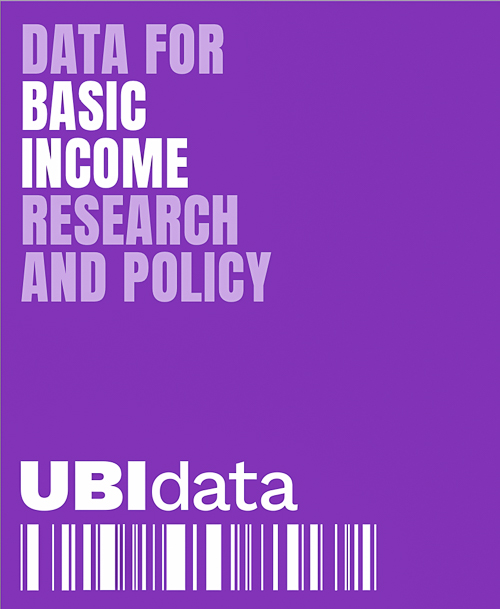
by Guy Standing | May 9, 2024 | Featured
Find the Chinese translation here for Guy Standing’s talk in China. The original English of the talk can be found below.
Throughout history, capitalism has evolved, changing character and changing the class structure defining each era. The changes in the 20th century can be understood by reference to what Karl Polanyi called the Great Transformation. Briefly, in his formulation, in the 19th century, mainly in Britain, there was an initial period in the evolution of industrial capitalism that was dominated by financial capital, in which old systems of distribution, regulation and social protection were dismantled, in what we would call the pursuit of a ‘free market economy’.
In Polanyi’s terminology, this was a period in which the economy was ‘dis-embedded’ from society, that is, out of control by civilising social forces. As a result, inequalities and economic insecurities multiplied until there was a systemic crisis, and in his words ‘a threat of the annihilation of civilisation’. This manifested itself in the Great Depression, and the rise of fascism and a dehumanised form of state socialism in the Soviet Union.
After the Second World War, there was an era in which the capitalistic economy was re-embedded in society through what is usually called welfare state capitalism, led by countries of western Europe, and welfare capitalism, mainly in the USA. There were many distinctive features of this period of capitalism, which we will not discuss here. However, most relevant for the narrative of this presentation, it was a period in which capital made concessions to the main working class, the proletariat.
It was the era of a brief triumph of social democracy. In return for accepting capital’s right to manage and control the accumulation process, the state pursued policies that shared the gains from economic growth between capital and labour while partially decommodifying labour. The state provided labour-based security, and a broadening array of non-wage state benefits, while capital provided non-wage enterprise benefits to employees. What should be called the social income of workers shifted steadily away from the money wage, as the value of non-wage benefits rose. As we know, similar policies were part of Leninism in the Soviet Union and the danwei ‘iron rice bowl’ policy in the China of the 1950s and 1960s.
The proletariat under capitalism were, in effect, provided with labour-based security against what are called contingency risks, such as unemployment, accidents and illness, and lifetime hazards, such as maternity and old-age. But this security was made strictly conditional on the performance of labour and the willingness to perform labour, or being a dependent person on somebody performing labour. So, it was really fictitious labour decommodification. If you did not provide full-time labour, you had no security, or what you had was determined by being dependent on a wage labourer.
Two problems became acute in the 1970s. Because the money wage had fallen to being a low percentage of total labour remuneration, there was no incentive to perform labour productively. This reached extreme form in the Soviet Union, in which workers had a joke, ‘They pretend to pay us, we pretend to work.’
The second problem was devastating for industrialised capitalistic economies. The welfare state capitalism model had in effect taken labour out of international trade. Countries producing competitive manufacturing commodities had similar levels of labour costs, with similar non-wage benefits, while developing economies had very low labour costs but were producing mainly complementary primary goods. That meant labour costs were not a major factor in international trade. But in the 1970s, this changed dramatically, with the emergence of export-oriented ‘newly industrialising countries’ (NICs), mainly in south-east Asia. For that and other reasons, welfare state capitalism experienced acute crisis. The embedded phase of Polanyi’s Great Transformation collapsed.
This led to the neo-liberal economics revolution, led by economists known as ‘the Chicago school’. Once again, advocates of capitalism were in ascendancy, advocating a ‘free market economy’, but really supporting financial capital and stronger state regulation of labour, designed to weaken the bargaining position of workers and to lower their social income. It was a period of labour re-commodification, in which non-wage benefits and social services were cut and in which social democratic political parties lost power.
But, as argued in my books, the ‘free market’ neo-liberalism was only a transitional phase. By the 1990s, financial capital was firmly in control, and a form of capitalism emerged that was the opposite of what the neo-liberals claimed they wanted. It is best described as global rentier capitalism. It was the triumph of private property rights, in which more and more of the income flowed to the owners of property – physical assets, financial assets and so-called intellectual property.
This new system came into full effect in 1994, when an international agreement was reached called TRIPS, the Trade-Related Aspects of Intellectual Property. This globalised the US system of intellectual property rights. It marked the hegemonic pinnacle of the United States. At that time, China was not included. It only joined the World Trade Organisation in 2001, after which China rapidly expanded as a rentier state, soon filing more patents and other forms of intellectual property rights, giving monopolistic profits to leading corporations and financial capital.
The point of most relevance to this lecture is that globalised rentier capitalism meant that more and more income flowed to property owners and less and less flowed to those who performed labour and work. Real wages stagnated or fell in industrialised capitalistic countries and income and wealth inequalities rose all over the world. Making all that worse was that governments gave huge subsidies and tax breaks to their major corporations to increase their competitiveness in export markets.
…and the class structure changed
Meanwhile, due to globalisation, an ongoing technological revolution and neoliberal labour and social policies, a new globalised class structure took shape. Every configuration of capitalism produces a new class structure, and it is a mistake of some Marxists to portray the class structure in dualistic terms, as if classes and the class structure are the same today as they were in Marx’s time in the 19th century.
A class can be defined in terms of three dimensions – distinctive relations of production, distinctive relations of distribution and distinctive relations to the state. Bearing that in mind, we may briefly describe the global class structure under rentier capitalism.
In descending order of average income and state power, at the top is the plutocracy, made up of a tiny number of billionaires, making most of their vast income from forms of property. Below them is an elite, mainly in managerial positions, but also gaining from property. Then there is a small group of independent self-employed, which I call proficians, making a lot of money but living insecurely. Then, there is a larger salariat – those with salaried employment, occupational pensions, houses and shares.
These four groups are defined in detail in my books. The crucial points for this lecture are that, first, all are recipients of rentier income, and second, all are objectively and emotionally detached from existing welfare states. They do not gain much from social policies and do not expect to need them. It is often overlooked that the salariat, as well as the plutocracy and elite, have done very well during the rentier capitalism era, gaining in particular from asset price inflation. The new class structure is not the “1% versus the 99%”, as too many commentators have claimed.
All this means that those top strata – perhaps accounting for 25% of the population in most countries – have little inclination to defend wages, labour standards or state benefits, unless they are driven by fear of losing their privileges as a result of a revolt from disadvantaged majority below them in the structure.
Below those groups in the evolving class structure is the old proletariat, for whom social democratic political parties and labour unions were built, and whose interests were advanced globally by the International Labour Organisation. The key points here for this discourse are that, first, the proletariat was subject to proletarianization, that is, habituated to the disciplines of stable full-time labour, and second, they experienced fictitious decommodification, in that the money wage shrank as a share of social income, with more non-wage benefits giving them labour security. As stated earlier, it was not real decommodification, since they were obliged to sell labour (effort and time) in order to obtain those entitlements, or be married to someone prepared to do so.
For the proletariat, the norm was and is to be in a stable full-time job. They were induced to have a form of false consciousness. Their political representatives wanted as many people as possible in full-time labour. They romanticised being in a job, promising Full Employment, and quietly resorting to what is known as ‘workfare’, that is, by denying benefits to anybody not providing labour. As socialists, they conveniently forgot that being in a job is being in a position of subordination, and failed to recall Marx’s depiction of labour in jobs as ‘active alienation’.
The norm of the proletariat’s relations of production was employment security, not occupational security, in that they have had to do what activity they are told to so. They have been exploited in workplaces and in labour time. As for their relations of distribution, those in the proletariat were never rent-recipients, having no income from property. But as a norm they were also not structurally exploited by rent mechanisms.
This leads to the emerging mass class of rentier capitalism, the precariat. This is not an ‘under-class’, which is a category cut off from society. The precariat’s distinctive relations of production include having unstable, insecure labour, having to do a lot of work that is not labour, including work for the state, having no occupational or organisational narrative to give to themselves, and being exploited and oppressed off workplaces and outside labour time as much as within them.
Many are being drawn into what in the economics literature is called ‘platform capitalism’, as ‘concierge’ workers or as ‘cloud taskers’, controlled and manipulated by apps and other labour brokers. Above all, they are being habituated to precariatisation – the opposite of proletarianisation, that is, pressured to accept and adapt to a life of unstable labour without a secure occupational identity. The nearest equivalent in China is the vivid idea of ‘the ant tribe’.
The precariat’s relations of distribution are distinctive. First, they must try to survive solely on low, volatile and uncertain money wages, with few if any non-wage benefits or assured state benefits. Second, they are systematically subject to exploitation by rental mechanisms, living constantly on the edge of unsustainable debt. The insecurity they experience is unlike that of the proletariat, being characterised by chronic uncertainty and fragility in the context of unpredictable but common shocks to their lives.
That is bad enough. However, it is the distinctive relations to the state that most define the precariat. The primary antagonist of the precariat is the state, rather than capital directly. The reality is that they are losing or not gaining the rights and entitlements of citizens. Above all, they are reduced to being supplicants, dependent on the discretionary benevolence of landlords, employers, parents, charities and strangers, hoping they will show them pity. The etymological root of precariousness, from the Latin, is ‘to obtain by prayer’. The precariat are almost like beggars; they must rely on people’s charity. They have no secure rights, and so experience constant insecurities.
It is important to emphasise that the precariat is a class, in that capital and the state want it to exist as a functional part of the productive system. But below the precariat is a huge and growing lumpen-precariat, an ‘underclass’, consisting of millions of people living and dying in the streets prematurely, from social illnesses, opioids and suicidal depression. The underclass represents a threat to the precariat. It reminds them that unless they conform to the new norms, they could fall into an even worse existence.
The precariat is the core working class of the 21st century. But it is important to emphasise that the precariat is a class-in-the-making not yet a class-for-itself. What this means is that, whereas members of the precariat are conscious of the conditions that define themselves, they are not yet united in having a common vision of what type of transformed society they want. Indeed, the precariat consists of three groups.
The first can be called Atavists. These are people who came from old proletarian families or communities and who look back to a real or imaginary life of labour security. They tend to be relatively low-educated, and want to recover the Past. This group has tended to support neo-fascist or populist politicians, like Donald Trump, who promise to bring back some imaginary glorious Yesterday.
The second can be called Nostalgics. These are mostly migrants and racial minorities, who feel they do not have a home anywhere. They do not have a Present, a Here-and-Now. They will not support neo-fascists or populists, but feel and are dis-enfranchised, left out of society. There are a huge number of people in this group, and from time to time they indulge in ‘days of rage’.
The third faction in the precariat can be called Progressives. These are mainly the young and educated, who were promised a Future if they went to university or college, but who come out with no Future other than the prospect of persistent debt and uncertainty. They too will not support a neo-fascistic agenda. But across the world they are looking for a new Future.
It is this third group that could be the vanguard of a new progressive politics. The reason why they are a new dangerous class is that they do not identify with either capital or labour. They do not suffer from a false consciousness, of believing that an ideal situation is to be in full-time jobs. Of course, most do want jobs, out of necessity. But they see jobs as instrumental, not defining their lives, identities or aspirations. We must appreciate that the precariat are not just ‘victims’. They are also active and are seeking an alternative reality to what is the norm of today.
This is behind the new phenomenon in China and elsewhere of ‘lying flat’, simply not conforming to the norms imposed by capitalism, norms that say people should strive to be successful economically and should labour hard in the hope or expectation of upward social mobility. Political leaders must respond to the precariat’s sense of agency and their aspirations.
The Age of Uncertainty
The precariat is growing in size in the context of an unstable global economy, in which the main feature is unpredictable uncertainty. This is made more severe by a unique combination of historical forces. Capitalism has always been unstable, as Marx first made clear. But he could not have anticipated the way today’s rentier capitalism has coincided with a seismic technological revolution and an ecological crisis, in which financial crises, natural disasters and pandemics are increasingly widespread and global in character.
We are living in a transformational moment, a time of constant crisis, in which, to recall Karl Polanyi’s assessment of the 1920s, the world could either lurch into a dark night of authoritarianism, philistinism and neo-fascism or it could make a decisive turn into a new age of Enlightenment. At the moment, the first seems more likely. But it can be averted.
The key point on which to concentrate is that we are living in an age of chronic uncertainty, in which crises pile into one another, plunging masses of people in almost every country deeper into social and economic insecurity, impoverishment, stress and ill-health.
There was the financial crash of 2008, followed by more than a decade of ‘austerity’ in western countries (when state benefits and public social services were severely reduced), a series of six pandemics just since the beginning of the century culminating in Covid, with more to follow. And now a ‘cost-of-living’ crisis as inflation surges, exposing more people to unsustainable pressures. In the background are disgusting wars that are little more than neo-colonial land grabbing. If we are not scared by all that, we should be.
In 2007, a Lebanese-American financier Nassim Taleb coined the term ‘black swans’ to designate social and economic shocks that are rare, unpredictable and have devastating consequences. It was a good metaphor. Most swans are white; it is a shock to see a black one. However, today social and economic shocks are not rare at all. But they are uncertain in terms of when, where and why they occur and who will be adversely affected. As such, you and I cannot be confident that we will not be among the victims. Most people feel vulnerable.
There is something else too. It looks as if a growing proportion of the population will be affected by the shocks. It was predicted, for example, that two-thirds of the population of Britain would suffer from fuel-related hardship during the winter of 2022-2023, bringing more deaths and ill-health. That is what has happened, resulting in more homelessness, more queuing outside ‘food banks’ (places where food donations are given out to the poor) and more debt. And, of course, Britain is not alone. Everywhere, natural disasters, such as extreme weather events, hit numerous whole communities, and being in a job these days is far from a guarantee of escaping poverty or economic insecurity.
Three deductions should flow from this bleak scenario. First, more rapid economic growth will not overcome the threats; it could merely accelerate global warming and the existential crisis. Second, the old social policies are not valid for tackling the new crises. Third, there is an unprecedented need to build societal Robustness (immunity to shocks) and societal Resilience (the ability to cope with and recover from shocks), based on a new income distribution system and a new social protection system. ‘Targeting’ assistance on a minority would be futile and inequitable, if only because it is a majority who are actually vulnerable.
This is the modern reality. Yet there is an awful hesitancy among politicians. It appears as if even nominally socialistic parties are sleepwalking into self-defeating timidity, bringing to mind Gramsci’s chilling aphorism written from prison in 1930:
‘The crisis consists precisely in the fact that the old is dying and the new cannot be born; in this interregnum a great variety of morbid symptoms appear.’
Appeasement is in the air. So-called leftish political parties criticise the plutocracy, and yet accept their largesse in the form of donations and media support. Their leaders take every opportunity to tell ‘business’ that it will be safe in their hands. In the west, the political landscape is occupied by social democratic ‘think tanks’, exuding respectability, seeking ‘relevance’ and eagerly expressing ‘moderation’, granting them continuing access to benevolent ‘donors’. Governments are reacting to events, not being prepared to control them.
There is a fear of the grand narrative or vision of the Future, and a willingness to play a game with rules set by the rulers, the financiers and the plutocracy. That must end.
Basic Income: Anchor of Freedom, Security and Eco-Socialism
So, in China and in all significant countries, it should be clear that the old income distribution system has broken down – the labour share of income has fallen, the precariat has grown and will become more restless, alienated, insecure and angry unless structural change takes place – and there will be more ecological and economic crises, and more pandemics.
It is a transformational moment. It is a time for a new Manifesto, not the old Communist Manifesto of 1848, but a Precariat Manifesto. There is no time in this lecture to consider all elements in such a Manifesto. I want to conclude by just considering one fundamental policy, which almost every country could afford. And I want to argue that its justification is philosophically grounded.
The proposal is that everybody in society should be provided by the state with a modest basic income, a monthly amount paid individually, without behavioural conditions, paid regardless of income, wealth, work status, marital status or gender. It should be paid equally to men and since the intention would be to give each resident citizen and equal ‘share’ of public wealth, strengthening social solidarity. The level of basic income would be set by a government-appointed but administratively independent council, and could be paid from a Commons Capital Fund, a form of sovereign wealth fund, as elaborated in my recent books.
There are three philosophical rationales for a basic income. The first is that it is a matter of common justice. The income and wealth of all of us in society are determined mainly by the contributions of many generations of our ancestors. But it is impossible to know whose ancestors contributed more or less. If we allow for the private inheritance of private wealth, as every society does, then we could see a basic income as a form of common dividend, a share of inherited public wealth.
In addition, all societies were built on the commons, which belong to all of us equally – the land, sea, seabed, the natural resources and the social amenities built by past generations. Karl Marx was radicalised in the 1840s not by anger at exploitation in capitalistic factories or mines but by seeing how the commons were being taken away from the peasants and other commoners.
In every country, over the centuries elites and commercial interests have taken the commons, depriving commoners of their heritage. The demand for a basic income is a demand for compensation for that deprivation.
A basic income would also be a matter of inter-generational justice. In every country there are areas where economic growth and capital accumulation have been more rapid than elsewhere. But often, areas of past growth become areas of decay and backwardness, whereas the wealth was taken elsewhere. An equal basic income paid to everybody across the country would equalise the gains and actually raise living standards in poorer areas relative to richer areas, reducing income inequality.
A basic income would also be an instrument of ecological justice. The rich cause far more pollution and greenhouse gas emissions than the poor. But the poor suffer much more from pollution, which damages health and living standards. Every country needs to raise taxes on carbon and fossil fuels more generally. This will only be politically feasible if it is guaranteed that the revenue is recycled as part of the basic income.
It would also be an instrument of what should be called compassion justice. Instead of reducing citizens to supplicants, relying on state charity in times of emergency or relying on other forms of charity, each citizen would have an equal economic right. In other words, a basic income would reduce the role of the state as charity provider, which should surely be an objective of any socialist.
A basic income would also be an instrument of work justice. Under capitalism and old-stye state socialism, only the performance of labour has been regarded as deserving of remuneration by a money wage. This is sexist and absurd. The performance of care work, done mostly by women, is just as productive – it is reproductive – and in ageing societies is becoming even more important as contributing to a Good Society. A basic income would encourage and reward care work and community work on which society depends.
The second ethical or philosophical justification for a basic income is that it would be an instrument for promoting freedom. Most social thinkers, not just Marxists, claim to be in favour of freedom. But freedom requires assured access to material resources. There are three forms of freedom that a basic income would strengthen.
First, there is what can be called libertarian freedom. This is the freedom that is what neo-liberals and other capitalist advocates emphasise – the freedom to choose. The trouble is that is meaningless or insulting if people are poor or chronically insecure, in which case they have to do whatever is necessary in order to survive. The freedom to say “No” to an exploitative employer or landlord can only exist if the person has access to material resources with which to survive.
Second, there is what should be called liberal freedom. This is more interesting for a Marxist. It is the freedom to be moral, the freedom to take decisions that one believes are morally consistent with one’s values and culture. Again, unless a person has basic income security, they cannot easily take the moral course of action. But the state should wish to strengthen its citizens capacity to be moral.
Third, a basic income would strengthen republican freedom. This is the freedom from arbitrary interventions in a person’s decision-making. A person is not free if she has to seek approval from a husband or father or other figure of authority, even if that person is a very benevolent person. A person is only really free if they can make decisions themselves, whether or not others approve.
So, a basic income would strengthen all three forms of freedom. It remains to consider the third ethical or philosophical justification for basic income. And this is perhaps the most distinctly relevance for our era. A basic income would promote basic security.
Basic security is a fundamental human need. It is also what economists call a public good, in that if one person has it, that does not deprive others from having it. Indeed, I would call it a superior public good, in that if everybody has basic security, the whole community is likely to gain.
But we should distinguish basic security from total security. If you are too secure, you are likely to become careless or indolent. What is needed is basic security so that you know that you will be able to survive even if you have an accident, an illness or make a mistake in your life. And psychologists have shown that unless a person has basic security, their mental capacity declines, their intelligence actually drops and their capacity to make rational decisions drops. Seen that way, it is unfair of the state to expect people to behave with a sense of social responsibility if its people are economically insecure. A basic income responds to all that.
And here we come to the crucial points of most relevance in this age of uncertainty. Throughout the 20th century, social policy was built on the presumption that the state would provide protection after an adverse event hit somebody, such as unemployment or an illness, for which a probability of it occurring could be calculated and a rough estimate of the likely cost could be calculated. But today every part of the world is struggling with chronic uncertainty. People live in fear, feeling a new shock will hit them and their community at any time, but not knowing in advance how it will affect them and if they will be able to cope and recover.
In such circumstances, we need a system of ex ante social protection, that is, a full guarantee that basic security will exist. A basic income is the only way to provide such protection. Of course, it is not sufficient in itself, but it is necessary as an anchor of a Good Society.
Besides the three philosophical justifications – justice, freedom and security – a basic income is also justifiable economically. It could provide an automatic macro-economic stabiliser, that is, it could be adjusted upwards in times of economic crisis and downwards in times of economic boom, or at least have a component that could be adjusted in that way.
And there is evidence of its positive effects from basic income experiments. This speaker has been fortunate enough to be able to help put into practice a policy in which he believes. Experiments, using independent objective methods, have been done in which thousands of peoples from very different types of community have been provided with basic incomes, with the results being monitored over several years. They have been done in countries as different as Canada, India, the USA, Spain and Kenya.
Everywhere the results have been broadly similar. Basic income results in improvements in health, particularly mental health. In low-income communities in particular, it results in better nutrition, most notably for young children. It results in improved attendance in school and fewer drop-outs from school. It has an emancipatory effect for women. And, contrary to critics, it results in an increase in work, not less, and in increased productivity in work. And it results in a reduction in income inequality, not just because the amount is proportionately more for low-income people but because it enables the lower-income people to increase their economic activity. Perhaps most encouragingly of all, if all members of a community are provided with basic incomes, that induces a strengthening of social solidarity.
Basic income is not a panacea. But it an imperative if society is to experience a reduction in all the ills of chronic economic and social uncertainty. In his speeches, President Xi has said dozens of times that income inequality must be reduced in China. In other parts of the world similar sentiments are expressed. Providing a basic income would be a powerful way of reducing the inequalities that could otherwise become explosive over the next decade. Let us promote it.






